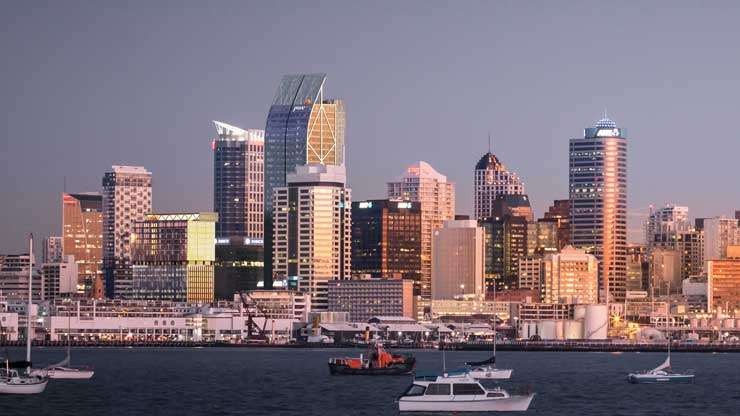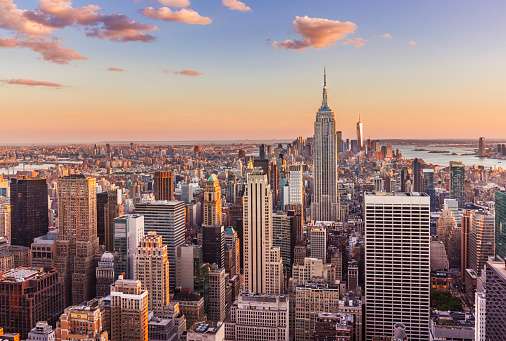Think house prices are challenging now? If the next 20 years are anything like the last 20 for the New Zealand housing market, then buyers and sellers could be in for a wild time.
The average price of a house in Auckland could rise to almost $3 million by 2040 - more than three times what it is now - according to new forecast data from OneRoof.
The figures suggest Wairoa in Hawke's Bay will be the cheapest place to buy property in 20 years' time, with house prices there expected to rise to a still affordable $353,309.
The most expensive to buy will still likely be Queenstown - but buyers there may have to stump up $4.79 million for a home, as opposed to about $1 million now.
Start your property search
The figures come as one of New Zealand's leading agents told OneRoof that he expects Auckland to be be home to $20 million suburbs by 2040.
OneRoof looked at the change in the median sale price for every territorial authority in New Zealand between 1999 and 2019 and applied the same percentage increase to current house prices. The exercise was to see what the prices would look like if the market surge of the last 20 years repeated itself over the next two decades.
According to the data, Wellington's median sale price would hit $2.37 million - $1.62 million above what it is now - while Christchurch would rise to $1.25 million - an increase of $811,000 on the current median sale price.
OneRoof editor Owen Vaughan says: "At the end of every year, housing market experts are asked to predict what will happen in the next one, but we thought we would go out on a limb and look at what house prices might look like in 20 years' time.
"The last 20 years have seen major changes to the housing market, with prices rising between 200 and 500 percent for the majority of the country.
"Although there have been significant drivers in the market that may not be repeated over the next 20 years - such as high levels of immigration - it's possible that Kiwis will be paying the kind of prices that only the wealthy can afford now.

Auckland's house prices have jumped 253 percent in the last 20 years. A similar leap on current price levels could see the city's median sale price hit $2.93 million.
"Remember, New Zealand was in shock when the median price in Herne Bay crossed the million-dollar mark almost 20 years ago, and now half the suburbs in Auckland carry that price tag."
The data shows other big leaps: Dunedin, currently the most affordable major metro, could see its median sale price hit $1.97 million if it carries on its current trajectory, ahead of Hamilton, which could have a median sale price of $1.91 million. The boom in Whanganui could bring about a median sale price of $1 million by 2040.
Eight under $1m
The forecast data indicates there will be just eight territorial authorities with a median sale price of less than $1 million - Wairoa ($353,309); Grey ($572,727); Buller ($654,545); South Taranaki ($720,000); Waitomo ($800,333); Tararua ($881,667); Westland ($957,586); Ruapehu ($972,426); and Gore ($993,103). Forty regions will have a median sale price of between $1 million and $2 million, 15 will have a median sale price of between $2 million and $3 million. The most expensive authorities will be Otago ($3.17 million) and Queenstown.
James Wilson, director of valuation innovation at OneRoof's data partner Valocity says: “Trying to predict what house prices will be in 2020 is difficult enough, so our predictions for 2040 should be taken with a big grain of salt. However, you can analyse current and past performance of the property market to try and determine future trends”

Queenstown will still be New Zealand's most expensive place to buy property in 2040.
“Strong demand has supported value growth over the past 20 years and our analysis of sale prices since the end of 1999 shows dramatic changes in the market. Many of our main urban centres, in particular Auckland and Queenstown, are now unaffordable on an international scale. This is important as when affordability constraints begin to take effect it can have an impact on future value growth."
OneRoof commentator and former Property Institute of New Zealand CEO Ashley Church says that secret to understanding the future of the property market is to understand its past. “Over the past 40 years we’ve seen house prices, in most of New Zealand, increase by between 70 percent and 100 percent or more, every decade – and there’s no reason to believe that that pattern will change."
However, he does caution that the rate at which house prices increase may reduce to the extent that they have been driven by lower interest rates. “While I don’t necessarily believe that there’s a direct correlation between lower interest rates and higher house prices in recent years – there’s little room for rates to drop much further and I think that will pace a natural cap on how much people can afford to spend on a home," he says.
Unknowable factors
Mike Jones, senior economist with the ASB, says: “If we assume house prices increase roughly in line with incomes for the next 20 years (instead of increasing by much more than incomes like the prior 20 years) a house that’s worth $1 million today will increase to a value of around $2.4 million by 2039.”
But, Jones says, it’s hard to be definitive about what the next 20 years will bring given we don’t know the shape of some pretty important factors, such as population growth and the political backdrop. “But we do think the housing market is going to have a tough time matching its past performance," he says. “Some of the macro factors that underpinned the prior two-decade housing boom are no longer around.”

Auckland could look more like New York in 20 years' time.
From 1999-2019 the population increased by about a third, lending standards were free and easy, and the level of debt relative to income and house prices was relatively low - times aren’t what they used to be, says Jones.
The idea of further big leaps in the housing market isn't as far-fetched as it seems. Real estate agent Graham Wall, who sells houses at the top end of the market in New Zealand, reckons there will be $20 million suburbs by 2040. “You ain’t seen nothing yet,” says Wall.
“We live in the only country on earth with a truly golden future and every day every part of it becomes more and more valuable. In the last 100 years demand has exceeded supply for all housing but particularly for property in prime positions.”
That demand, especially with the expat Kiwis Wall expects will come pouring back home, will not only continue but accelerate.
Assuming inflation and wages increase at the same rate, “a $10 million house in 20 years will be a $40 million house and a $1 million house will probably be a $6 million house.
“There won’t be a suburb in Auckland that isn’t a million-dollar suburb. Otara will be a million dollar suburb.”
And already exclusive suburbs like Herne Bay and Remuera will be $20 million suburbs, Wall says, because Auckland just gets better and better. “There’s 80 new restaurants going to open in Auckland in 12 months - this town’s on fire.”
New York in NZ
UP Real Estate director Barry Thom won’t be drawn into price predictions 20 years out, but does say within even 10 years we may not recognise the country's biggest housing market. The Auckland of the future could more resemble the New York of the now, he says, with people living in high density apartments and housing during the week and the wealthy trekking to our version of The Hamptons, where wealthy New Yorkers go, at the weekends.
“New York is essentially now all apartments and the most expensive are the biggest ones and then they go out to the Hamptons because they want to get away from the density of the city. It could be the Coromandel, it could be up north, your Matakanas. It could be the West Coast develops hugely,” he says.
Prices in those areas could then potentially go through the roof, Thom says.
“There’s going to be a whole lot of suburbs potentially we may not recognise by virtue of not just density but also the height to boundary rules and what that does for how houses look and feel,” Thom adds.
People who currently enjoy a nice back yard may find that decimated by what happens next door, he says. And as baby boomers with property retire they might be quite happy for their large piece of land in a nice suburb to be carved up while they move to a lock and leave.
“Even now all the ridge lines are being bought up and we’re getting high rises pretty much all the way along Jervois Road, along New North road, all those areas,” he says.
With a lot of apartment blocks and high or medium rise developments not needing to consider parking any more, some nice streets might find themselves clogged with cars.
And while special properties in areas like Herne Bay, Parnell, Remuera and beachfront will always get huge prices, intensification could actually mean an overall lower average value, Thom says.
- Additional reporting by Catherine Masters








































































